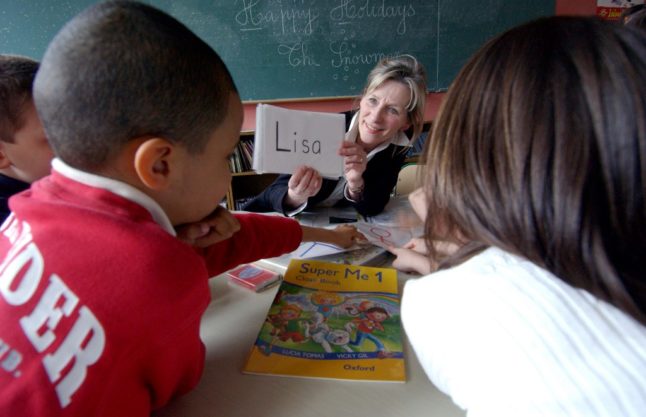Recently Madrid’s government caused controversy when it announced it would hire extra native English teaching assistants (auxiliares) for the region’s bilingual schools for the 2014–2015 school year.
Unions slammed the move, saying the teachers were being hired 'via the back door' and lacked the necessary Spanish qualifications – mainly the 'oposiciones', Spain’s public entry examinations.
They also criticized the fact that Spanish teachers are required to speak both languages whereas the "Anglophones aren't expected to speak Spanish".
"Being born in Ireland or the UK isn't anything special in itself," Miguel Muñiz, former head of FSIE, the largest Spanish union representing primary and high school teachers in Spain's private education sector, told The Local
His successor, Carlos Iglesias, agrees: "We have 6 million people unemployed in Spain, many of whom are qualified teachers.
SEE ALSO: Top tips for teaching English in Spain
"It seems like we want to put an end to the UK’s unemployment rate and not ours."
Both men reiterate they have nothing against the public school system in general but think authorities need to ensure those schools hire qualified teachers.
They also acknowledge that 'Anglos' are always more likely to speak better English than Spaniards.
"Native English teachers don’t necessarily have the grammatical knowledge or educational training to deal with and teach a classroom full of kids," Iglesias argues.
"That’s something qualified Spaniards who have done public examinations do most likely have.
"Bilingual education is what sells," the FSIE head concludes.
"Madrid’s government is slashing education funds everywhere and they’re using this native English assistant tactic as a marketing campaign."
Away from the state education system — whether public or private — requirements may be different.
Teachers working in the country's many private language 'academies' may not necessarily have to do training on how to engage with kids or 'drill' the language into a classroom of children, but is there still tension resulting from Anglos' being favoured over more-qualified Spaniards?
"There’s such a high demand for native speakers that some language schools will take on people with no previous experience or who don’t have any relevant qualifications under their belt," Fran O’Hara, recruitment agent for ASTEX language school in Madrid tells The Local.
According to O’Hara, speaking Spanish isn't a must when hiring teachers for her school’s company classes, although some pupils do request their teachers have "some knowledge of the language".
"It’s the clients who request the native speakers. They want someone who has cultural and contextual understanding of the English language.
"Spanish teachers of English may be very good at explaining grammar but they haven’t necessarily lived in an English-speaking country long enough to have the linguistic traits of a native.
"Pupils also want to lose their Spanish accents when speaking English and feel the only way to do so is with a native speaker."
Asked if she thought a Spanish qualification should be a prerequisite for native English teachers in the private sector, O’Hara suggested that a qualification such as a TEFL, CELTA or DELTA as well as some relevant work experience were sufficient to be well-suited for a position in the industry.





 Please whitelist us to continue reading.
Please whitelist us to continue reading.
Member comments